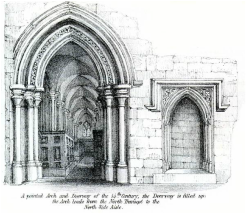 Proper 21A 2014 A sermon preached by the Rev. Beth Maynard If you could go back in time and ask Ralph Adams Cram, the renowned architect of this church, what he meant by Gothic style, I’m sure you would get a very complex answer. I wish I were able to be at Adult Forum today to hear more about how Emmanuel’s building reflects Cram’s ideals. However, I think one part of his answer, and probably the major part of the answer you’d get from most of us amateurs if you asked us to describe Gothic style, would be this: It has arches. Specifically, arches that soar up and come to a point at the top. Our arches here are in an earlier, less pointy style than some, but as you look around our building you’ll see arches everywhere. Even from the outside. And it’s quite lovely, I think, that the same day we feature Cram, we also have probably the most famous poetic arch in Scripture in our Epistle reading. ....
2 Comments
Proper 20A 2014
The sermon at Emmanuel today was preached without a full written manuscript by our deacon the Rev. Christine Hopkins. It led us in reflection on Matthew 20:1-16. Proper 18A 2014
A sermon preached by the Rev. Beth Maynard About every year or so a new quiz seems to appear on the Internet claiming to tell you what religion you should be. The first one I remember was the Beliefnet Belief-O-Matic back in the late 90s, but there are many examples, and I’ll bet several of you have taken one. If you haven’t, here’s how they work. You click through and the quiz begins with a message like “Let's figure out which religion, if any, best suits your beliefs.” Then it asks you a series of questions about what your current opinions are, for example, “what do you think happens after death?” and “Do you prefer a religion in which people participate in rituals?” and “should roles for women and men be the same or different?” And then it spits out the name of an organized religion that more or less reflects what you already think. Now taking online tests like that is fun, and posting your results is fun, and it might give you good results for some kinds of faith groups, I’m not really sure. But the underlying assumptions of this kind of test are 180 degrees off from, certainly, any Christian way of approaching spiritual life, and more particularly any Anglican way of approaching spiritual life, and my guess is probably from the Jewish way as well, though I would want to let someone from their community make that call. What underlying assumptions am I talking about? Number one, that religion is about ideas. About what you think. Your opinions. And number two, that the normal way to engage with religion is to find one whose ideas you already agree with. I can’t speak for any other faith groups. But for Christians, these assumptions are so off base that once you make them, you probably can’t end up with a recognizably Christian conclusion. .... |
Archives
July 2024
Categories |

 RSS Feed
RSS Feed